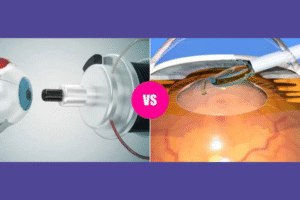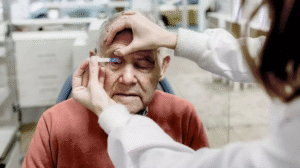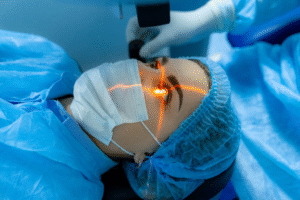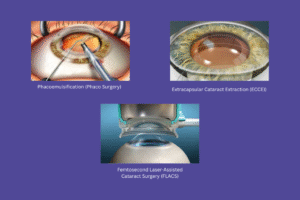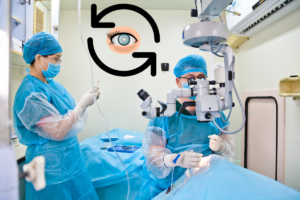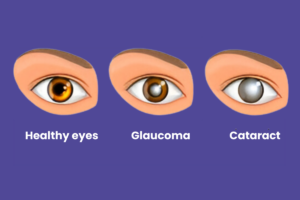What do I wish I knew before cataract surgery?

Cataract surgery is one of the most common and safest procedures performed worldwide, with millions of people regaining clearer vision every year. But like any medical procedure, it’s natural to have questions and even uncertainties before you go through it.
Many patients, after their surgery, often say: “I wish I had known this before!”
In this blog, we’ve compiled insights, tips, and things most patients wish they knew before undergoing cataract surgery — so you can be well-prepared, confident, and informed.
- It’s not as scary as it sounds.
- You may still need glasses after surgery.
- Your eyes might feel strange for a few days.
- You should plan for recovery — Even if it’s quick.
- The results are often life-changing.
- You need to arrange for someone to accompany you.
- You might be surprised by the emotional impact.
Table of Contents
Toggle1. It’s not as scary as it sounds
Many people fear the idea of “surgery on the eye.” But the reality is:
- The procedure usually takes 10–15 minutes per eye.
- It is painless, as you’re under local anesthesia.
- There are no stitches in most modern surgeries (phacoemulsification).
- It’s often done on an outpatient basis, and you go home the same day.
Wish I knew: It’s quick, painless, and far less intimidating than I imagined.
2. You may still need glasses after surgery
Cataract surgery improves your vision by removing the cloudy lens and replacing it with an artificial one (IOL). But:
- You may still need reading glasses or bifocals, depending on the type of lens chosen.
- Multifocal or premium IOLs reduce the need for glasses, but may come with their own pros and cons.
Wish I knew: The type of lens you choose affects how much you’ll rely on glasses afterward. Do your research and talk to your doctor.
3. Your eyes might feel strange for a few days
After surgery, it’s normal to feel:
- Grittiness or mild irritation
- Light sensitivity
- Slight blurriness
- Watery eyes
These usually settle within a few days to weeks.
Wish I knew: Mild discomfort is part of the healing, not a sign of something wrong.
4. You should plan for recovery — Even if it's quick
While cataract surgery recovery is relatively fast:
- Avoid rubbing your eyes or getting water into them for at least a week.
- Don’t lift heavy objects or bend too much.
- Use eye drops as prescribed — they are critical for healing and preventing infection.
Wish I knew: Even with a quick recovery, you still need to take precautions for optimal healing.
5. The results are often life-changing
Patients often report:
- Better colors (whites look whiter, colors are more vibrant)
- Clearer, sharper vision
- Improved night vision
- Enhanced overall quality of life.
Wish I knew: How dramatically and quickly my world would become brighter and clearer.
6. You need to arrange for someone to accompany you
After the procedure, you:
- Will not be allowed to drive.
- May feel drowsy or disoriented.
- Should avoid commuting alone.
Wish I knew: It’s essential to plan for someone to help with transport and support after surgery.
7. You might be surprised by the emotional impact
Many patients feel emotional after the surgery. Some feel overjoyed seeing clearly again; others may feel overwhelmed adjusting to the change.
Wish I knew: Cataract surgery affects more than your eyes — it can uplift your mood and daily life.
Conclusion
Being mentally, physically, and emotionally prepared for cataract surgery makes all the difference. Knowing what to expect — from lens choices to recovery care — helps reduce anxiety and ensures a smoother experience.
At Krisha Eye Hospital, Ahmedabad, we guide patients at every step, offering expert consultation, advanced surgical options, and compassionate care.
Thinking of cataract surgery? Book your appointment today at Krisha Eye Hospital.
Author bio
Dr. Dhwani Maheshwari, an esteemed ophthalmologist with over 10 years of experience, leads Krisha Eye hospital in Ahmedabad with a commitment to advanced, patient-centered eye care. Specializing in cataract and refractive surgery, Dr. Maheshwari has performed more than a thousand successful surgeries. Her expertise lies in phacoemulsification, a technique recognized for its precision in cataract treatment.
Dr. Maheshwari’s educational journey includes an MBBS from Smt. NHL MMC, a DOMS from M & J Institute of Ophthalmology, and a DNB in Ophthalmology from Mahatme Eye Bank Eye Hospital, Nagpur. She also completed a fellowship in phacoemulsification at Porecha Blindness Trust Hospital, further enhancing her surgical skills. In addition to her work at Krisha Eye Hospital, Dr. Maheshwari serves as a consultant ophthalmologist at Northstar Diagnostic Centre.
Under her leadership, Krisha Eye Hospital aims to bring all superspecialties under one roof, offering comprehensive eye care solutions for all vision needs.
FAQs
Ask about lens options, post-surgery expectations, risks, recovery care, and whether you’ll still need glasses.
If your vision affects reading, driving, or daily activities, surgery may improve safety and quality of life.
It’s generally safe, but minor risks include infection, inflammation, glare, or lens dislocation — most are treatable.
Typically, one eye is done first, and the second is scheduled a few weeks later to ensure proper recovery.
You may notice improvement within 1–3 days, but full stabilization may take 3–4 weeks.
Many return to light work in 2–3 days, but full activity (including screen use, driving, lifting) varies based on healing.





